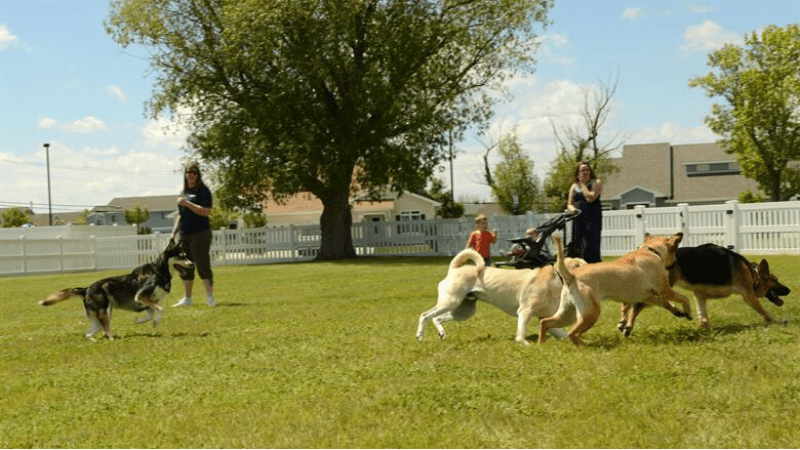🐾Allow 2-3 minutes to read 🐾
Dog parks can be fantastic places for your pup to let loose, burn off some energy, and interact with fellow dogs. For dogs who stay home all day while owners are at work, this is a great opportunity for exercise, mental stimulation, and socialization. While most dog parks are public areas and may or may not have posted rules, there’s still an implied etiquette for pet owners to follow when bringing their dogs to the park. Here’s a fairly comprehensive list of items to remember:
Dog parks can be fantastic places for your pup to let loose, burn off some energy, and interact with fellow dogs. For dogs who stay home all day while owners are at work, this is a great opportunity for exercise, mental stimulation, and socialization. While most dog parks are public areas and may or may not have posted rules, there’s still an implied etiquette for pet owners to follow when bringing their dogs to the park. Here’s a fairly comprehensive list of items to remember:
The number one rule of all dog parks: pick up after your pup. It may be tempting to leave that pile of poop (after all, one stool’s not that bad, right?) and keep moving. But if every dog owner refused to pick up after their pets, think of how messy – and smelly – your dog park would become. In addition, animal feces can spread bacteria, parasites and disease. Keep your pets away from animal feces for their own safety. If your dog park doesn’t provide bags for picking up poop, make sure to be a good neighbor and bring a few of your own.
Another important thing to consider is the safety of your own pet. Does your local dog park have a fenced area? The whole point of going to a dog park is to let Buddy off his leash so he can run free for a bit. If the area isn’t fenced in, it could be easy for Buddy to run off if he gets distracted by a squirrel or another dog. Some dog parks will define “leashed” vs. “off-leash” areas. Never let Buddy off-leash in a leashed area, for his own safety and out of courtesy for other pets and their owners. Make sure that he’s wearing a collar at all times, preferably with his rabies tag and microchip number in case he gets lost.
In the summer months, it’s also important that your dog park has a shady area where your pooch can relax and cool off after exercise (and benches for pet-owners to relax!). It’s easy to overheat and become dehydrated after running around in the humidity and hot summer sunshine. Make sure to bring a water bowl for your dog to drink from. Shared/community water bowls are harborers of bacteria and communicable disease.
As pet-parents, we are constantly concerned with our pet’s wellbeing. If you bring your dog to public places like dog parks, it is absolutely essential that he’s up-to-date on vaccines. You never know if other pets have been vaccinated, and it would definitely not be in Buddy’s best interest to expose him to kennel cough! Heartworm and flea/tick protection is another must. You never know what your dog could come in contact with in an outdoor environment. Let’s not forget about the other pups at the park: keeping your dogs current on vaccinations and preventatives protects other dogs from getting sick just as much as it protects your own.
Have your dogs been spayed/neutered? If not, you’ll definitely want to avoid dog parks. Don’t ever bring an intact dog to the dog park. Not only are intact dogs at risk of becoming pregnant or impregnating other dogs, but their hormones can also cause fights and distractions.
If your pooch wants to play with any other dogs at the park, approach the dog owner first to make sure it’s alright with them. They may not be comfortable with their dog interacting with others for various reasons. If they’re ok with the two dogs playing together, introduce them while on leashes before you let them run around. This will allow you to maintain control of your dog (and vice versa) if the two of them don’t get along. We encourage you to keep an open mind while at the dog park — some pet owners may not accept responsibility for their pet’s behavior, especially if it’s not acceptable to other dog owners.
It’s not usually recommended to bring a young puppy under four months to a dog park. Young dogs have weaker immune systems, and they also may not have finished their vaccinations yet. Some pet owners think that dog parks are great places to socialize their puppies, but this is not always in the puppy’s best interest. Teach your puppy to interact safely with other dogs in a more controlled environment, and then utilize a dog park when she’s older to keep her mentally and physically stimulated. Controlled environments include places like puppy classes, walks around well-traveled lakes, and public parks.
Always take charge of your dogs. They should obey simple commands like “sit” and “come” so that you can control them in the event that a situation arises. Your dogs need to consider you as their “alpha” at all times, or they may take advantage of the freedom an off-leash dog park offers and get into trouble. If your dog has a tendency to be territorial or aggressive, make sure to warn other dog owners and keep your dog leashed when other dogs are around.






